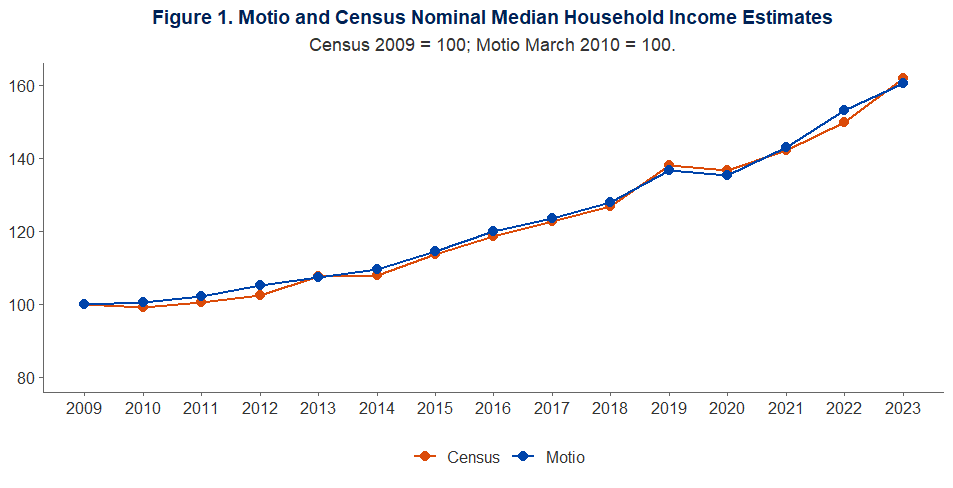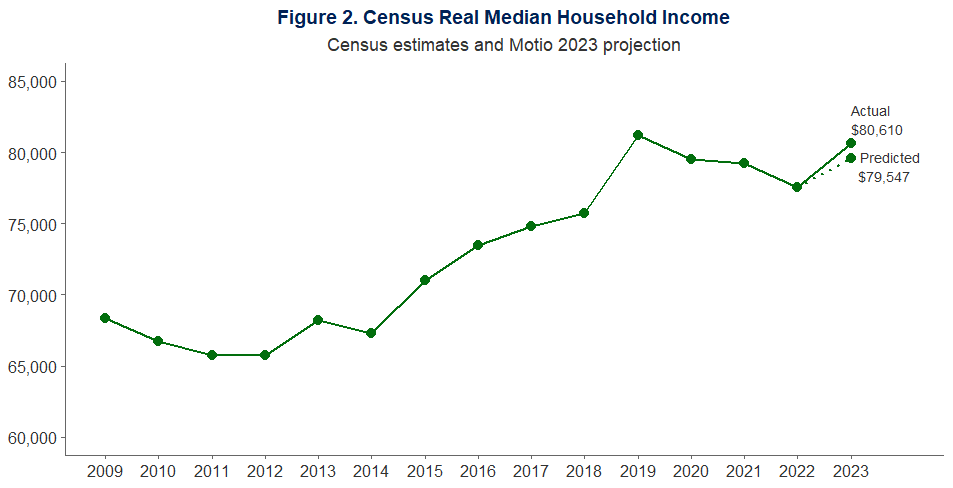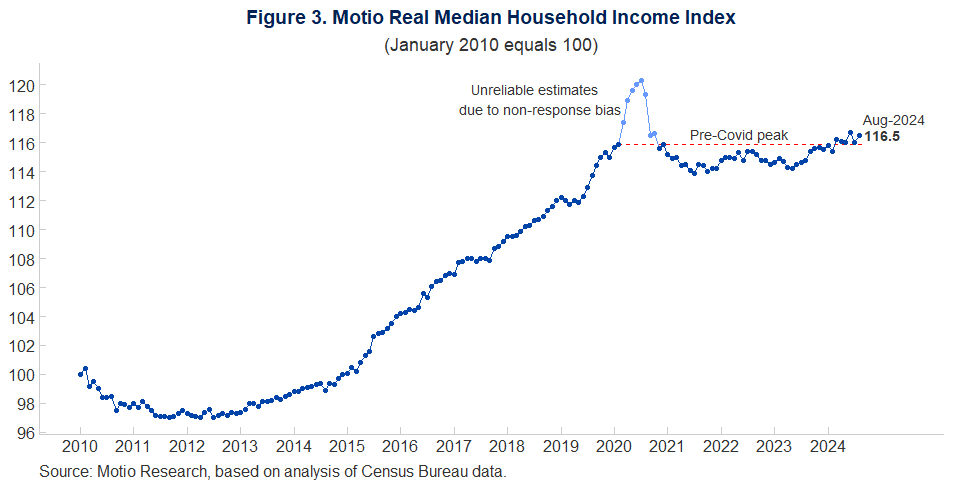Today we present a guest post written by Matías Scaglione and Romina Soria, co-founders of the data science and economic consulting firm Motio Research.
In May 2024, we presented our prediction for the 2023 Census nominal and real household income data, using estimates derived from CPS microdata as predictors. The prediction used the March values from Motio’s nominal, non-seasonally adjusted series as the best approximation of the Census’s previous calendar year values (further rationale can be found in the referenced blog post and in the post introducing the series). The strong correlation between the March nominal values and the Census nominal values is clearly visible in Figure 1.
Following our guiding principles of simplicity and clarity, we ran a simple regression to predict the 2023 Census nominal household income estimate, using Motio’s series as the sole predictor. This exercise yielded an expected nominal increase of 6.7% in U.S. household income for 2023, rising from $74,580 to $79,547. Adjusted for inflation using the Chained Consumer Price Index, we predicted a real increase of 2.6%, from $77,510 to $79,547. As noted in the May blog post presenting the prediction, the anticipated increase “would be the first increase in U.S. real median household income after three consecutive declines from 2020 to 2022.” Figure 2 below shows the predicted versus actual 2023 Census estimates in historical context.
The Census Bureau released the 2023 Median Household Income estimates on September 10, 2024. The report confirmed our prediction of a recovery after three consecutive years of decline: “This is the first statistically significant annual increase in real median household income since 2019.” Although the magnitude of the recovery was higher than anticipated, with a nominal increase of 8.1% (vs. our predicted 6.7%) and a real increase of 4.0% (vs. our predicted 2.6%), the Census estimates fell within our predicted range. Additionally, the recovery in household income signifies a return to pre-Covid maximum values, which our public index had already indicated in the March 2024 estimate (see Figure 3).
The release of the 2023 Census annual estimates reaffirmed the historically strong association between the Motio and Census household income series, further validating the reliability of Motio’s monthly estimates. This demonstrates that the Motio median household income series stands on its own, offering a timely key metric of U.S. national economic well-being every month.
This post written by Matías Scaglione and Romina Soria.



The Census Bureau released the 2023 Median Household Income estimates on September 10, 2024. The report confirmed our prediction of a recovery after three consecutive years of decline: “This is the first statistically significant annual increase in real median household income since 2019.”
Nice update of an impressive analysis. Of course the fools who follow fake PhD EJ Antoni will not be told about this.
Yale historian Timothy Snyder has offered a description of…Trumpism? Today’s Republican Party? The two are difficult to distinguish, and certainly the GOP has evolved toward Trumpism, so it’s worth knowing what we’re dealing with:
https://snyder.substack.com/p/fantasy-impotence-fascism
Snyder’s is a three-part description: Fantasy-Impotence-Fascism. He writes well, so do yourself a favor and click the link.
The gist is:
Fantasy – There is no true or false, only stories. Snyder cites Vance’s idiot claim that he tells “stories” to highlight issues and leaves it to the press to worry about facts. We all recall Kelly Anne’s “alternative facts”, I trust? Trump’s fear-mongering about crime when the FBI tells us crime is historically low? Election denial?
Impotence – Government can’t do anything. This middle part of the three-part description isn’t exactly what it seems. Snyder’s point is that Trumpism denies that government can do anything EXCEPT address our rage. Government’s job, one it can do quite well if unconstrained by law, is to react to rage. Haitians can be deported once Trump and his surrogates have stoked rage over the fate of a missing cat. The cat is home and safe now, thank you very much, but in the fantasy world, that’s beside the point. The approximate focus of government, the only thing we can rely upon government to address, is public rage, manufactured by the GOP. I don’t see that as new, as purely Trumpian. Guns, race, religion, abortion, crime – the GOP has relied on white rage for decades.
Fascism – The consequence of rage; rinse and repeat. The end result is fascism, because the possibility of other forms of government is destroyed by rage at each other, rage at ourselves once “ourselves” have been made “other”. The possibility of government to any good end dies; there’s yer impotence.
You can see where the Antonis, the CoRevs and the Brucies fit in this scheme. They belch out fantasy. They declare governmental impotence. They model rage.
Enjoy your fascism.
People Are Calling Out Donald Trump For His Tweet About The Prices Of 8 Popular Foods
https://www.yahoo.com/news/people-calling-donald-trump-tweet-172629566.html
Check out Trump’s dishonest tweet about the price of 8 food items and the brutal rebuttal. My two favorites: (a) mocking anyone who pays $10 for coffee; and (b) “And they’re wondering if the man has ever gone grocery shopping in his life.”
He hasn’t. Now JD Vance went shopping and the store owner realized Vance is a MORON and overcharged him for that dozen of eggs. MAGA